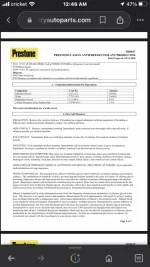- Joined
- Nov 29, 2021
- Messages
- 5,383
I wonder if thr Preston's Asian POAT uses 2EHA. Some of the info suggests it does ("All Preston's coolants have 2EHA" was statedI don’t believe the DEXcool thing was ever that significant in reality. The hyped up drama surrounding it was big 4 sure.
Anyway 2-eha is still wildly used.
Being poured into everything with wheels and universal coolants for years now by millions of folks having no idea that 2-eha exists. No vehicle apocalypse. I think we could probably move on now.
I'm afraid of 2EHA in coolant now. I've only seen one older Supertech bottle of Extended Life (this years ago) that stated 2EHA in "Ingredients." Still. I worry. Should I?
Pictured is Part # Prestone AF6600
Another question would be if 2EHA is in OE (let's take, for example, Subaru) coolants, and if stuff they recommend for newer vehicles goes backwards to the 2000s and 90s.. is it engine specific?
I also agree there shouldn't be "Moly" in coolant. That's an oil thing. Transmission fluid is sometimes called Transmission oil. Coolant is radiator fluid...

